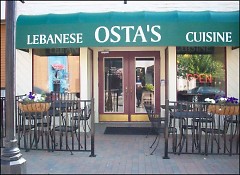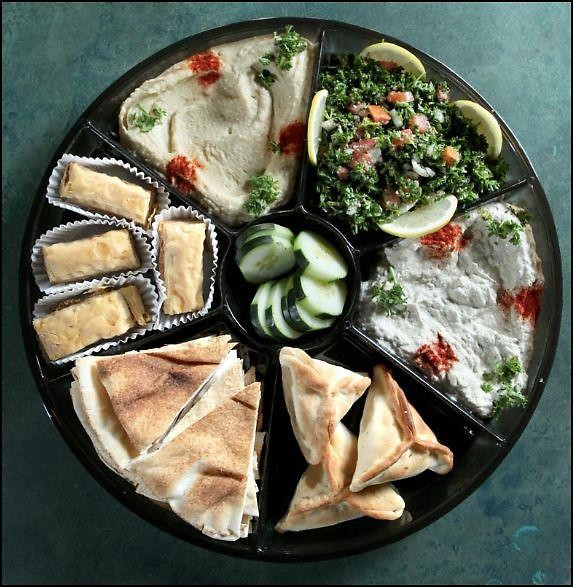Location and Website
Osta's Lebanese Cuisine
2228 Wealthy St SE
East Grand Rapids, MI
(616) 456-8999

Osta's Lebanese Cuisine in Gaslight Village /Osta's Facebook page

A sampling of delectable morsels handmade at Osta's Lebanese Cuisine /Osta's Facebook page
Osta's Lebanese Cuisine
2228 Wealthy St SE
East Grand Rapids, MI
(616) 456-8999

Osta's Lebanese Cuisine in Gaslight Village /Osta's Facebook page
It stares down at you from its place above the right-hand door. Its protecting gaze covers the entire room, unblinking. It has been there for twenty years, watching over the Aouad family and their guests at the twenty-three year old Lebanese restaurant, Osta’s Lebanese Cuisine, in Gaslight Village.
While the dangers of the evil eye inflicting pain and bad luck are debatable, the talisman said to be protecting people from those possessing it has hung in the doorway of Osta’s for over twenty years.
Owner, A. John Aouad believes it has played a crucial role in the longevity of his and his family’s authentic Lebanese restaurant. In addition to possessing the evil eye talisman accompanied by freshly made Lebanese cuisine, Osta’s mimics the hospitable atmosphere of a true Lebanese household, inviting you in to dine and enjoy along with their family.
John comes from a history of master chefs, or ostas, from Lebanon.
“If I don’t cook, it’s like I’m not existing,” he said in a review by Julie Burch. His father served the king of Saudi Arabia as well as catered for 35,000 people in Geneva, Switzerland, winning a prestigious award after the crowds had eaten his food.
John moved the to U.S. where he met his Lebanese-American wife, Diane, and the two of them opened the restaurant, Osta’s. They now have a family of six, including themselves and their four kids: Dominique, John, Elias, and Nada. While some are involved year-round, all of them come together at peak seasons to wait tables and roll the famous American-favorite, stuffed grape leaves.
And this “family feel” is felt throughout the rather small 14 or so table restaurant. The ingredients making up the dishes at Osta’s are selected from authentic sources and do not include items that fall below par when it comes to creating the actual dishes. Canned chickpeas, for instance, do not find themselves mixed in with the hommous in the bowl on your table.
Diane even shows her guests how to eat this smooth, Lebanese staple the true Lebanese family way. She crafts small boats with bits of pita before almost popping the little morsels in her mouth. She stops at the last moment and puts the loaded-up pita back in the bowl, asking if anybody wants to try the bite she’s just “prepared.”
The guests that partake in these samplings of Lebanese cuisine are for the most part thrilled with Osta’s. There is a sense of family when one is eating there and Diane tries to greet everyone by name. The favor is equally returned, giving Osta’s the vibe of a true, family centered eating experience under the guise of Lebanese gastronomy.
“The food of Lebanon is a celebration of life; it is fresh, flavorful, diverse and invigorating,” boasts Osta’s website. And their variety of Lebanese food ranges from beef and lamb baked kibby to parsley-adorned hommous to the most popular, chicken tawook with garlic sauce.
“How you eat here is how we eat at our home,” Diane mentions with a smile that spreads across her whole face. A traditional Lebanese maza or “appetizer” typically includes 40 or so small dishes and, as the name implies, comes before the main dishes. Filling up on healthy, delicious foods is so much a part of the culture in Lebanon and among Lebanese families in general. Osta’s seems to accurately reflect this pertinent detail.
Perhaps it is the talisman that has kept Osta's open for the past 23 years. Perhaps it is the food. Or perhaps it is the genuine hospitality of the Lebanese culture.
And you don’t want to change any of those, no matter who or what is watching.
The Rapidian, a program of the 501(c)3 nonprofit Community Media Center, relies on the community’s support to help cover the cost of training reporters and publishing content.
We need your help.
If each of our readers and content creators who values this community platform help support its creation and maintenance, The Rapidian can continue to educate and facilitate a conversation around issues for years to come.
Please support The Rapidian and make a contribution today.